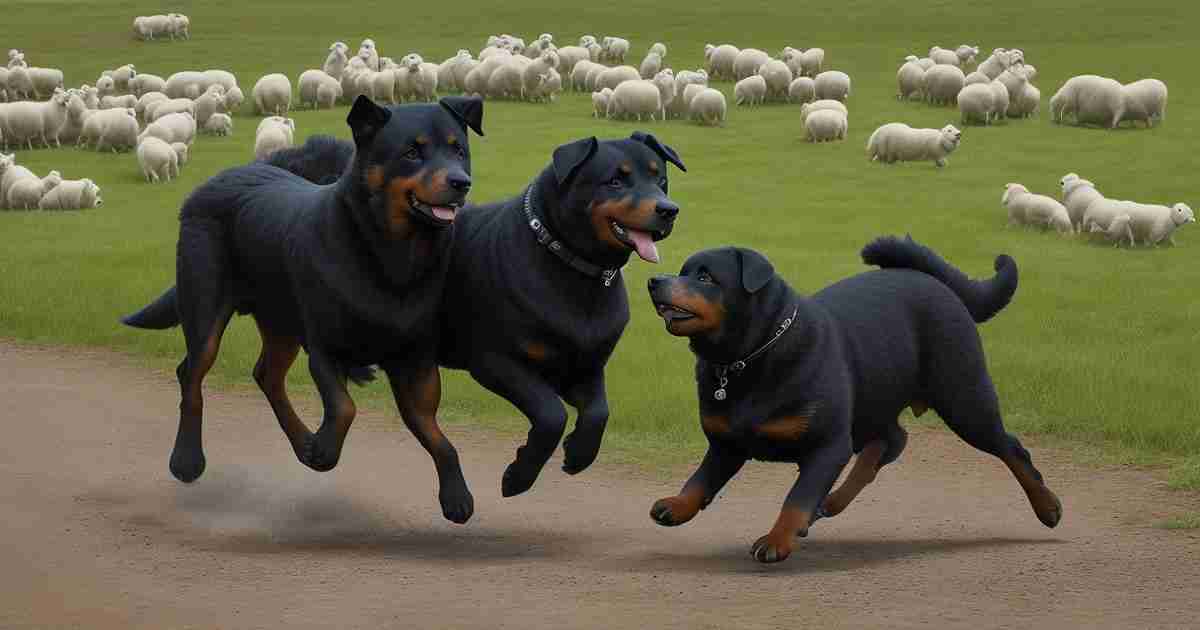Originating from the historic town of Rottweil in Germany, the Rottweiler emerges as a formidable presence in the realm of domestic canines, boasting a substantial physique that ranges from medium to large in size.
Within the realm of these noble creatures, one encounters the illustrious purebred Rottweilers, acknowledged by the names of full-blooded or pedigree Rottweilers.
These extraordinary canines, the torchbearers of generations past, exhibit an ancestral lineage deeply rooted in the essence of pure Rottweiler heritage, an attribute that they wear as a badge of honor through the annals of time.
Delineation of Full-Blooded Rottweilers versus Mixed Breeds:
- Full Blooded: In the realm of canines, a dog earns the coveted title of “full blooded” or “purebred” when its lineage boasts an impeccable ancestry.
Both of its parents must proudly hail from the same distinguished breed, and their lineage, extending through the annals of time, must bear testament to the unwavering allegiance to this breed.
These regal canines, paragons of breed purity, typically find themselves in the esteemed company of pedigrees, holding the illustrious distinction of being registered with renowned kennel clubs. As a testament to their heritage, they bear pedigree papers that attest to their noble lineage.
- Mixed Breed: On the flip side of the canine spectrum, we encounter the enchanting world of mixed breed dogs.
These charismatic canines, unlike their full-blooded counterparts, boast parentage that transcends the boundaries of a single breed. Picture a captivating blend, perhaps a Rottweiler intertwined with the affable Labrador Retriever.
These mixed breeds, blessed with a genetic mosaic from diverse origins, often exhibit a captivating combination of traits, showcasing the rich tapestry of their multifaceted heritage.
However, they stand apart from their purebred peers as they do not possess the esteemed pedigree papers that validate their lineage.
Unearthing the Rich Tapestry of Rottweiler History and Origins
In a tapestry woven through time, the storied lineage of the Rottweiler breed can be traced back to the hallowed days of ancient Rome.
In this bygone era, these resolute canines found their purpose as loyal herding dogs, orchestrating the movement of cattle to bustling markets while standing vigilant as guardians of the precious money pouches adorning the cattle’s necks.
As the Roman legions embarked on their conquests into Germanic lands, these valiant ancestors of the Rottweiler made the voyage alongside, their unwavering loyalty serving as a testament to their indomitable spirit.
Within the quaint German town of Rottweil, a transformation was underway. These intrepid dogs underwent a process of selective breeding, a meticulous craft aimed at honing their innate talents for cattle herding, drafting, and safeguarding.
As the butchers of the time plied their trade, they called upon these stalwart canines to serve as sentinels, protecting their livestock and dutifully pulling carts laden with succulent cuts of meat destined for the market.
In the annals of history, this distinguished breed became synonymous with the moniker “Rottweiler Metzgerhunds” or, in translation, the butcher’s dogs.
Yet, the tides of progress and industry wait for no one. With the advent of the 19th century, the era of rail transport swept across the land, rendering cattle driving obsolete.
It was a pivotal juncture for the Rottweiler, as their purpose metamorphosed once more. These resolute canines found themselves in the service of law enforcement, the military, and as steadfast guardians.
Their tenacity and loyalty were once again on full display, this time in the defense of nations.
Fast forward to the dawn of the 20th century, and a milestone awaited. In 1900, the inaugural Rottweiler breed club was born on German soil, marking an epoch where breed standards were meticulously etched into the record books.
The illustrious journey of the Rottweiler reached across the Atlantic, as the American Kennel Club (AKC) formally embraced the breed in 1931, bestowing upon them the recognition they so rightfully deserved.
Thus, the Rottweiler’s legacy, steeped in the pages of history, continues to flourish, a testament to their unwavering valor and enduring companionship.
Delving into the World of Rottweiler Breed Standards and the Eminent Pedigree Documentation
The American Kennel Club (AKC) stands as the arbiter of discernment when it comes to Rottweilers, meticulously outlining a set of comprehensive breed standards that encompass both their physical attributes and their temperament.
To be graced with the esteemed title of “purebred” by the AKC and the coveted pedigree papers that accompany it, Rottweilers must exemplify the following criteria, akin to a canine masterpiece:
Physical Features:
- These noble creatures are characterized by their stature, which oscillates between medium and large, exuding a commanding presence.
- Their physique is sculpted with a stocky, muscular build, an embodiment of strength and vigor.
- Adorned in a sleek, obsidian coat, Rottweilers bear the distinctive mahogany and rust markings that embellish their regal form.
- A docked tail, short and purposeful, completes their silhouette, adding to their signature charm.
Temperament:
- The Rottweiler’s inner essence is a symphony of virtues, as they exhibit unwavering confidence, standing resolute in the face of challenges.
- Courage courses through their veins, an unyielding resolve that manifests in their actions.
- Beneath their imposing exterior lies a heart that beats with an innate calmness, an attribute that fosters composure even in the most trying situations.
- Their loyalty knows no bounds, a devotion that binds them to their human companions with an unbreakable bond.
- The tapestry of their intelligence weaves intricate patterns of understanding and adaptability.
- A protective instinct, like a sentinel’s vigilance, is an integral part of their character, safeguarding those they hold dear.
- Their loyalty, akin to an unwritten oath, is unwavering and steadfast, a beacon of trustworthiness.
It is of paramount importance to acknowledge that responsible Rottweiler breeders adhere to these exacting standards with unwavering commitment.
They embark on a noble quest to pair Rottweilers that meet these criteria, ensuring that only those with the most illustrious lineage are chosen for reproduction.
The culmination of this meticulous process yields pedigree paperwork, a hallowed document that serves as a testimonial to the dog’s undiluted Rottweiler lineage, affirming their place in the annals of purebred royalty.
Now, as we turn our gaze toward the distinctive traits and characteristics that define full-blooded Rottweilers, we enter a realm where their remarkable essence is unveiled.
With a single glance, the world is introduced to these magnificent, powerful canines, each a testament to the breed’s enduring legacy.
Let us embark on this journey to unravel the key facets that set them apart, both in physique and temperament.
Exploring the Stature and Distinctive Physical Attributes of Rottweilers
In the realm of Rottweilers, size and physicality come together to create an imposing presence that commands both admiration and respect. Here, we delve into the specifics of their dimensions and the unmistakable features that define these regal canines:
Size:
- Standing tall at the shoulder, Rottweilers grace us with a height that ranges between 22 to 27 inches, a testament to their noble stature.
Weight:
- The scale tells the tale of their might, with Rottweilers weighing in at a range of 85 to 135 pounds, embodying a substantial and robust build.
Build:
- Their physique is a living embodiment of power and athleticism, characterized by a stocky, muscular frame that exudes strength in every sinew. They are the epitome of agility and vigor.
Distinctive Look:
- The visage of a Rottweiler is a study in distinctiveness, an ensemble of features that leaves an indelible mark.
- Their head boasts a broad skull, adorned with a prominent black nose and lips, exuding an air of authority.
- Almond-shaped eyes, resplendent in rich brown hues, peer with intelligence and vigilance, revealing the depths of their character.
- Triangle-shaped ears, poised elegantly and hanging close to their cheeks, add to the allure of their visage.
- A straight, coarse coat of medium length drapes their form, with a base color akin to shiny jet black, accentuated by the regal rust to mahogany markings that grace their cheeks, above their eyes, chest, legs, and paws.
- Their tail, a testament to tradition, is often docked, leaving only 2-3 tail vertebrae in its wake, completing the symphony of their physicality.
In summation, these Rottweilers emerge as sturdy and robust working dogs, their sleek black coats and the warm embrace of rust accents conspiring to create a visual masterpiece.
It’s an aesthetic that captures the essence of strength and elegance, making them undeniably handsome in the eyes of admirers.
Unveiling the Tenacious and Noble Temperament of Rottweilers
Beneath the striking exterior, Rottweilers reveal a temperament that reflects their unwavering loyalty and courage, traits that have endeared them to the hearts of many:
Confident:
- They exude an air of quiet confidence, possessing a calm yet authoritative presence. Rottweilers are well aware of their capabilities.
Courageous:
- When the call of duty beckons, they rise to the occasion with unflinching courage. Their confidence is never mistaken for aggression, standing firm against threats when necessary.
Calm:
- At their core, Rottweilers are inherently relaxed, a disposition that, with proper training, evolves into mellowness and obedience.
Intelligent:
- Their innate intelligence shines through, making them highly trainable. In the ranks of dog intelligence, Rottweilers proudly claim the 9th position.
Loyal:
- Their devotion knows no bounds, forging deep bonds with their human companions. Their primary aim is to please, their loyalty an unwavering beacon.
Protective:
- Rottweilers are natural watchdogs, alerting their presence with vigilant barks when threats loom, staunchly guarding their beloved family.
In the tapestry of canine companionship, Rottweilers emerge as steadfast sentinels, embodying the quintessential traits of valor and devotion, making them cherished members of their families and esteemed protectors of their domains.
Navigating the Enthusiastic Energy and Exquisite Needs of Rottweilers
Rottweilers are renowned for their robust appetites and boundless reserves of energy, requiring a holistic approach to their care:
Exercise:
- To satiate their active spirits, Rottweilers demand long daily walks or invigorating jogs, coupled with ample time for exuberant play. Their hearts thrive on activities that engage both body and mind.
Mental Stimulation:
- The inquisitive minds of Rottweilers yearn for intellectual challenges. Training sessions, interactive toys, and engaging puzzle games are essential to prevent the clutches of boredom from taking hold.
Socialization:
- The path to balanced adulthood begins with early and ongoing socialization. This crucial practice helps ward off overprotectiveness or potential aggression issues, ensuring that their hearts remain open to the world.
Trainability and Varied Roles:
- Gifted with intelligence and an unwavering desire to please, Rottweilers shine in a multitude of roles:
- As cherished companions, they become wonderful family dogs, known for their gentleness with children.
- In the realm of working dogs, they excel as police K9s, search and rescue heroes, service dogs, and reliable guides.
- As athletes, they fearlessly embrace agility, dive off docks, and powerfully pull carts.
- The grand stage of conformation showing allows Rottweilers to strut their stuff with pride.
In summary, Rottweilers epitomize robustness and determination, wrapped in hearts brimming with affection. When nurtured with responsibility, these purebred companions blossom into wonderfully devoted members of the family.
Embracing the Commitment of Owning a Full Blooded Rottweiler
The decision to welcome a Rottweiler into your life carries profound responsibilities. Here, we delve into the multifaceted aspects of caring for these magnificent purebred canines:
Grooming and Healthcare:
- Grooming needs are minimal, requiring only occasional brushing and bathing.
- Shedding is moderate throughout the year, and regular brushing helps keep loose hair in check.
- Regular nail trims are essential to prevent cracking or splitting.
- Dental health should be a priority, with daily tooth brushing being ideal, supplemented by routine dental cleanings.
- Routine veterinary visits, commencing annually after the age of one, encompass eye exams, heart tests, and cancer screens.
Diet and Nutrition:
- Rottweilers thrive on high-quality diets that fuel their active lifestyles.
- A diet with at least 18% minimum protein content is recommended.
- Calorie control is crucial to prevent overeating, as these dogs have hearty appetites.
- Joint health is a priority, with supplements like chondroitin, glucosamine, and fish oils being beneficial.
- Feeding high-quality commercial dog food formulated for large breeds, divided into two meals per day, is advisable. Fresh water should always be readily available.
Training and Socialization:
- Obedience training is of paramount importance, establishing your role as the pack leader and inculcating good manners.
- Early and extensive socialization, during puppyhood, introduces your Rottweiler to various people, places, and other dogs, mitigating territorial tendencies.
- Daily physical and mental exercise is imperative to ward off boredom and the potential for destructive behaviors.
- Positive reinforcement and reward-based methods are highly effective for this intelligent yet strong-willed breed.
Finding a Responsible Breeder:
- Seek out a reputable breeder who meets specific criteria:
- AKC registered with proven champion pedigree bloodlines.
- Conducts health and temperament screenings for breeding dogs.
- Provides comprehensive health guarantees.
- Is forthcoming in answering all your questions.
- Demonstrates impeccable care and socialization of puppies.
- Avoid pet stores, backyard breeders, or those lacking health screens.
Costs of Owning a Rottweiler:
- Initial purchase prices range from $1,500 to $4,000 or more, depending on pedigree.
- The first year of ownership entails costs exceeding $3,500, covering medical expenses, supplies, and training.
- Annual expenses amount to over $1,500, encompassing food, routine vet care, and licenses.
- Rottweilers typically live for 10-12 years, potentially leading to lifetime costs exceeding $20,000.
Ideal Home Environment:
- An ideal setting includes a house with a fenced yard, although apartments can suffice with sufficient daily exercise.
- Rottweilers thrive in most climates, with a preference for cool to moderate temperatures.
- The involvement of all family members in training contributes to their well-being.
Pros and Cons of Rottweilers:
- Pros include their intelligence, loyalty, versatility in working roles, and their innate protective nature.
- Cons involve shedding, drooling, their strong-willed temperament, high exercise demands, and the associated costs of care. They may not be suitable for novice owners.
In closing, Rottweilers have the potential to become extraordinary companions for active families who commit to thorough training and lifelong care. Their deep devotion is a treasure to be cherished and reciprocated with love and responsible stewardship.
Addressing Common Inquiries about Full Blooded Rottweilers: Here, we provide answers to some of the most frequently asked questions about full-blooded Rottweilers:
What is the life expectancy of a full blooded Rottweiler?
- The average lifespan for Rottweilers spans 10 to 12 years, and with proper care and health screening, some have been known to reach their early teens.
Are full blooded Rottweilers good family dogs?
- Absolutely, Rottweilers can be wonderful family companions. They exhibit gentleness and protective instincts, especially with children. However, proper socialization and training from a young age are essential.
Do Rottweilers bark a lot?
- Rottweilers are not inclined to excessive barking. They do bark when they perceive threats but are generally not prone to incessant barking.
How much exercise does a Rottweiler need daily?
- Rottweilers are highly active dogs and require 60 to 90 minutes of daily exercise. Activities such as brisk walking, running, and swimming provide both physical and mental stimulation.
Are Rottweilers easy to train?
- Yes, Rottweilers are highly intelligent and trainable. They respond well to firm, consistent leadership and positive reinforcement training methods.
What health issues are common in Rottweilers?
- Common health concerns in Rottweilers include hip dysplasia, bone cancer, heart conditions, and eye problems. Reputable breeders typically perform health tests on their breeding dogs to mitigate these risks.
How much do full blooded Rottweiler puppies cost?
- The purchase price for a Rottweiler puppy can range from $1,500 to $4,000 or more, depending on the breeder’s reputation and the pedigree of the pup.
Are Rottweilers dangerous dogs?
- No, Rottweilers are not inherently dangerous. However, like any large and powerful breed, their behavior is largely dependent on their upbringing and the guidance of responsible owners. Proper training and socialization are key to ensuring they are safe family pets.
Can Rottweilers live in apartments?
- While Rottweilers can adapt to apartment living, it’s essential to meet their substantial exercise needs through regular walks, playtime, and mental stimulation. Access to a yard is ideal.
What is the best diet for a Rottweiler?
- A high-quality commercial dog food formulated for large breeds is recommended. Feeding 2-3 cups daily, divided into two meals, is generally appropriate. Always ensure fresh water is readily available.
Conclusion
This guide has offered a comprehensive insight into the world of full-blooded Rottweilers and their remarkable traits. Here are some final tips to consider when deciding if this pedigree pup is the right fit for you:
- Active Lifestyle:Rottweilers thrive with active owners who can meet their substantial exercise and training needs. Dedication is key.
- Training Time:Allocate time for training and mental stimulation. Rottweilers are intelligent dogs who benefit from firm guidance.
- Socialization:Early and ongoing socialization is vital to ensure a well-rounded and well-behaved Rottweiler.
- Health Screening:Responsible breeders should conduct health screenings for common issues, like hip dysplasia and heart conditions.
- Lifetime Commitment:Rottweilers typically live 10-12 years, so be prepared for a long-lasting bond with your loyal companion.
- Protectors:Rottweilers possess natural guarding instincts, so proper supervision is crucial.
- Togetherness:These dogs thrive when they can be close to their owners and be involved in family activities.
If you can provide the extensive care, training, and quality time that Rottweilers require, you’ll be rewarded with an exceptional canine friend for life.
These pedigree pups can make unparalleled companions when raised by experienced owners. Thank you for reading, and we hope you’ve enjoyed delving into the world of this special breed!










1 thought on “From Puppies to Protectors: Full-Blooded Rottweilers’ Journey Unraveled”